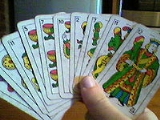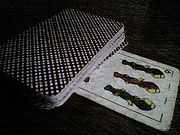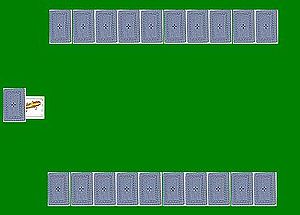
Tute
Encyclopedia
Tute (ˈtute) is an Italian trick-taking
card game for two to four players. During the XIX century, the game spread in Spain, becoming one of the most popular card games in the country. The name of the game was later modified by Spanish speakers, that started calling the game Tute. The game is played with a deck of traditional Spanish playing cards
, or , that are very similar to the Italian 40-card deck.
The classic versions of the game are the Individual Tute, while the most played is the Tute in Pairs, where four players form two teams. The objective of the game is to score the most points in the baza, with the alternate addition of points by canticles. Due to its wide popularity, several variations of the game exist, with modifications of the standard rules.
that has similar rules in the gameplay and final count of points. The name of the game originated from the Italian word Tutti (all), the canticle that the players announce when gathers the four kings. The game spread in Spain during the XIX century, by the Spanish troops that returned from missions in Italy. While the popularity of the game increased, the name of it was modified with the time by Spanish speakers, that started calling the game Tute. The game became one of the most popular in Spain, leading to the later appearance of regional variations of the game.
The game is played with a Spanish deck
, which is divided into four suits: Oros (coins), Espadas (spade), Copas (cups) and Bastos (batons). The 9s and 10s of each suit are excluded, leaving forty cards in the deck. The objective of the game is to score the most points in the baza; additional points can be scored from canticles.
 During the deal, each player receives ten cards. After the last card is dealt, the next one indicates the suit that becomes the trump
During the deal, each player receives ten cards. After the last card is dealt, the next one indicates the suit that becomes the trump
. The card is placed perpendicular to the stock, at the bottom.
After the first card is played, it is mandatory for the rival to play a card of a major value of the same suit in order to win the trick. If the rival holds a card of the same suit, but the value is minor to the first one, it can be played normally, losing the trick. If the second player does not hold a card of the same suit, the card to be played would be a trump.
The winning player takes both cards of the trick, and places them face down in a pile next to him, denominated baza. These cards are out of play until scores are calculated, at the end of the round.
 In order to always hold ten cards in the hand, the winner of the trick takes the first card from the stock, while the loser the second. When the trump card at the bottom of the deck is superior to a 7 (Ace, Three, King, Knight or Knave), the player that holds the 7 of the trump suit is able to exchange it for any of the ones previously listed. The 7, and the cards of a lesser value can later be exchanged only by a 2.
In order to always hold ten cards in the hand, the winner of the trick takes the first card from the stock, while the loser the second. When the trump card at the bottom of the deck is superior to a 7 (Ace, Three, King, Knight or Knave), the player that holds the 7 of the trump suit is able to exchange it for any of the ones previously listed. The 7, and the cards of a lesser value can later be exchanged only by a 2.
After a player makes the first baza, is allowed to chant (announce cards). Chanting is allowed until the last two cards are picked, when only a card and the trump in the bottom remain in the stock. After all the cards are picked up by both players, all of the cards they hold must be played in order to finish the trick. When the round is over, the players start to count their scores.
Tute games are played until a established number of points is reached. When a player wins a round, one point is added to the total of his score. After one of the players earns the points goal (three and six point games are the most common), the game is over and the player wins.
After a player of the first pair plays the first card, a player from the second pair, counter-clockwise, has to play a card of a bigger value of the same suit. If the second player has a card of the same suit but the value is minimum, it can be played normally, but if the player does not have a card of the same suit, the card to play will be a trump. Later the third and the fourth player will continue in the same way as their partners.
When all the cards of the trick are in the table (four cards in a four-player game) the pair that played the card of the bigger value wins the hand. The winning team places the four cards in their Baza. The canticles stand as in individual Tute, but it is important to remind chanting after a player or his partner begins a baza (only this team can chant) because after the first cards are picked by each team, no more chants are allowed. After the hand is over, starts the counting.
The deal of cards rotates Counter-Clockwise during the following hands. Normally, Tute games are played until reach a goal of points. Every time a pair of players wins a hand, gets one point. After one of the pairs earns the established points goal, the game is over and the Pair wins.
The rest of the cards are called cartas blancas (white cards) because their value is zero points. Only one suit of the deck
is the Triunfo (trump) also known as Carta que Pinta, this card is shown after the deal. All the cards of that suit can win to the other three suits of the deck during the game, except the cards of a bigger value of the same suit of the trump.
When a participant holds cards that allow him to announce more than one canticle, the player has to chant the values consecutively. If the player holds las cuarenta (forty) and veinte (twenty) in canticles, it is mandatory that he first announces las cuarenta, and then veinte. Otherwise, the player losses the rights to chant las cuarenta . If the player holds more than one veinte (twenty) in canticles, he can announce them in any order, not affecting the result.
Example:
Trick-taking game
A trick-taking game is a card game or tile-based game in which play centers on a series of finite rounds or units of play, called tricks. The object of such games then may be closely tied to the number of tricks taken, as in plain-trick games such as Whist, Contract Bridge, Napoleon, Rowboat, and...
card game for two to four players. During the XIX century, the game spread in Spain, becoming one of the most popular card games in the country. The name of the game was later modified by Spanish speakers, that started calling the game Tute. The game is played with a deck of traditional Spanish playing cards
Baraja (playing cards)
The Baraja is a deck of playing cards associated with Spain, it is usually called Baraja Española . It has four suits and is usually made up of 40 cards...
, or , that are very similar to the Italian 40-card deck.
The classic versions of the game are the Individual Tute, while the most played is the Tute in Pairs, where four players form two teams. The objective of the game is to score the most points in the baza, with the alternate addition of points by canticles. Due to its wide popularity, several variations of the game exist, with modifications of the standard rules.
Overview
Tute originated in Italy. The game belongs to the family of the game BriscaBriscola
Briscola , one of Italy's most popular games together with Scopa and Tressette, and a little-changed descendant of Brusquembille, the ancestor of Briscan and...
that has similar rules in the gameplay and final count of points. The name of the game originated from the Italian word Tutti (all), the canticle that the players announce when gathers the four kings. The game spread in Spain during the XIX century, by the Spanish troops that returned from missions in Italy. While the popularity of the game increased, the name of it was modified with the time by Spanish speakers, that started calling the game Tute. The game became one of the most popular in Spain, leading to the later appearance of regional variations of the game.
The game is played with a Spanish deck
Baraja (playing cards)
The Baraja is a deck of playing cards associated with Spain, it is usually called Baraja Española . It has four suits and is usually made up of 40 cards...
, which is divided into four suits: Oros (coins), Espadas (spade), Copas (cups) and Bastos (batons). The 9s and 10s of each suit are excluded, leaving forty cards in the deck. The objective of the game is to score the most points in the baza; additional points can be scored from canticles.
Individual Tute

Trump
A trump is a type of card in some card games.Trump may also refer to:* Trump * Trump * Trumps * The Trump * HMS Trump , a British submarine* The Trump Organization, a business conglomerate...
. The card is placed perpendicular to the stock, at the bottom.
After the first card is played, it is mandatory for the rival to play a card of a major value of the same suit in order to win the trick. If the rival holds a card of the same suit, but the value is minor to the first one, it can be played normally, losing the trick. If the second player does not hold a card of the same suit, the card to be played would be a trump.
The winning player takes both cards of the trick, and places them face down in a pile next to him, denominated baza. These cards are out of play until scores are calculated, at the end of the round.

After a player makes the first baza, is allowed to chant (announce cards). Chanting is allowed until the last two cards are picked, when only a card and the trump in the bottom remain in the stock. After all the cards are picked up by both players, all of the cards they hold must be played in order to finish the trick. When the round is over, the players start to count their scores.
Tute games are played until a established number of points is reached. When a player wins a round, one point is added to the total of his score. After one of the players earns the points goal (three and six point games are the most common), the game is over and the player wins.
Tute in Pairs
The game is played by four players, each one receives ten cards, therefore all the cards of the deck are dealt. The last card to deal will be shown to the rest of the players making it the trump, this card belongs to a player who later will take it again after shown.After a player of the first pair plays the first card, a player from the second pair, counter-clockwise, has to play a card of a bigger value of the same suit. If the second player has a card of the same suit but the value is minimum, it can be played normally, but if the player does not have a card of the same suit, the card to play will be a trump. Later the third and the fourth player will continue in the same way as their partners.
When all the cards of the trick are in the table (four cards in a four-player game) the pair that played the card of the bigger value wins the hand. The winning team places the four cards in their Baza. The canticles stand as in individual Tute, but it is important to remind chanting after a player or his partner begins a baza (only this team can chant) because after the first cards are picked by each team, no more chants are allowed. After the hand is over, starts the counting.
The deal of cards rotates Counter-Clockwise during the following hands. Normally, Tute games are played until reach a goal of points. Every time a pair of players wins a hand, gets one point. After one of the pairs earns the established points goal, the game is over and the Pair wins.
Card Values
| Card |  |
 |
 |
 |
 |
| Name | As (Ace) | Tres (Three) | Rey (King) | Caballo (Knight) | Sota (Knave) |
| Value (points) | 11 Points. | 10 Points. | 4 Points. | 3 Points. | 2 Points. |
The rest of the cards are called cartas blancas (white cards) because their value is zero points. Only one suit of the deck
Baraja (playing cards)
The Baraja is a deck of playing cards associated with Spain, it is usually called Baraja Española . It has four suits and is usually made up of 40 cards...
is the Triunfo (trump) also known as Carta que Pinta, this card is shown after the deal. All the cards of that suit can win to the other three suits of the deck during the game, except the cards of a bigger value of the same suit of the trump.
Canticles
After a player has won a hand in the game, in individual or pairs Tute, in some situations more points can be added to the total. During a two player game the players can chant the twenty points or the forty points until the last pick of cards from the deck, after which no players can chant. A player chants in the following situations:| Cards | Situation | The player chants | Value (points) |
|---|---|---|---|
 |
Four Kings in the hand at the same time. | Tute! | End of the game, direct victory. |
 |
A king and a Knight of trump suit in the hand at the same time. (in this example the triunfo are batons) | Las cuarenta! (The 40!) | 40 Points |
 |
A king and a Knight of any other of the three suits in the hand at the same time. (in this example, spades) | Veinte en (...)! (20 in Name of the suit!) | 20 Points |
When a participant holds cards that allow him to announce more than one canticle, the player has to chant the values consecutively. If the player holds las cuarenta (forty) and veinte (twenty) in canticles, it is mandatory that he first announces las cuarenta, and then veinte. Otherwise, the player losses the rights to chant las cuarenta . If the player holds more than one veinte (twenty) in canticles, he can announce them in any order, not affecting the result.
Final score
The total value of the baraja not counting the chants, only including the valuable cards and the final ten points is 130. The team that scores the last baza, additionally receives ten extra ponts. The final score is determined by the following procedure:| + | The sum of the points of each valuable card collected in the baza by a player or a pair of players. | In case of chanting, the respective chanted points (40 in case of a trump King-Knight pair, 20 in case of a regular card pair) are added to the final score. | If a player/pair wins the last play of the hand, receives 10 extra points that are also added to final score. |
| Score Counting | Valuable Cards + Canticles + Final 10 points | Final Score | |
Example:
| + | 2x Knaves (2 points), 1x King (4 points), 3x Three (10 points), 2x Ace (11 points) | 40 in batons (trump, 40 points) | Last play of the hand won (10 points) |
| Score Counting | 60 points + 40 points + Final 10 points | 110 points | |

